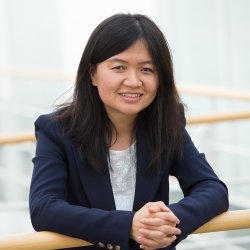Producing sustainable, stable, low-cost batteries
The Science and Technology Facilities Council website has highlighted work on sustainable batteries by Dr Qiong Cai, a Senior Lecturer in our Department of Chemical and Process Engineering.
Dr Qiong Cai from the University of Surrey and her collaborators from two London universities are investigating the use of hard carbons for battery materials. Their research sheds light on what kind of materials would be beneficial for batteries and would enable a faster charging process, to help produce a more sustainable source of energy storage.
“Different types of batteries have different properties and application areas,” explains Qiong. “For example, lithium ion batteries have relatively high energy and high power density, so they’re well suited for use in electric vehicles and portable electronic devices. Other types of batteries, meanwhile, are more suitable for different applications.
“We’re looking at battery technologies that may not have very high energy and power density, but are very low cost and very stable and can operate for a long time.
“Our research focuses on sodium ion batteries. This type of battery has promise because sodium is very abundant on Earth and it has a much lower cost when compared to lithium. So if we can make this type of battery work, then we don't have to worry about the depletion of the world’s lithium reserves and we’ll have created a more sustainable technology.
“It also means we don’t have to negotiate with a few politically sensitive countries where lithium is mined.”
The collaborative project, funded by the Engineering and Physical Sciences Research Council, involves three key groups. Qiong leads the team at Surrey, which uses computational modelling to design materials, while Professor Magada Titirici at Imperial College London synthesises the materials, and Professor Alan Drew in Queen Mary University of London works on the advanced characterisation of the materials.
And the results so far are promising.
“We’re now in the final year of a three-year project,” adds Qiong. “The long-term applications of this work include renewable energy and energy storage, and I’d certainly love for us to continue it.”
Find out more about the Department of Chemical and Process Engineering
